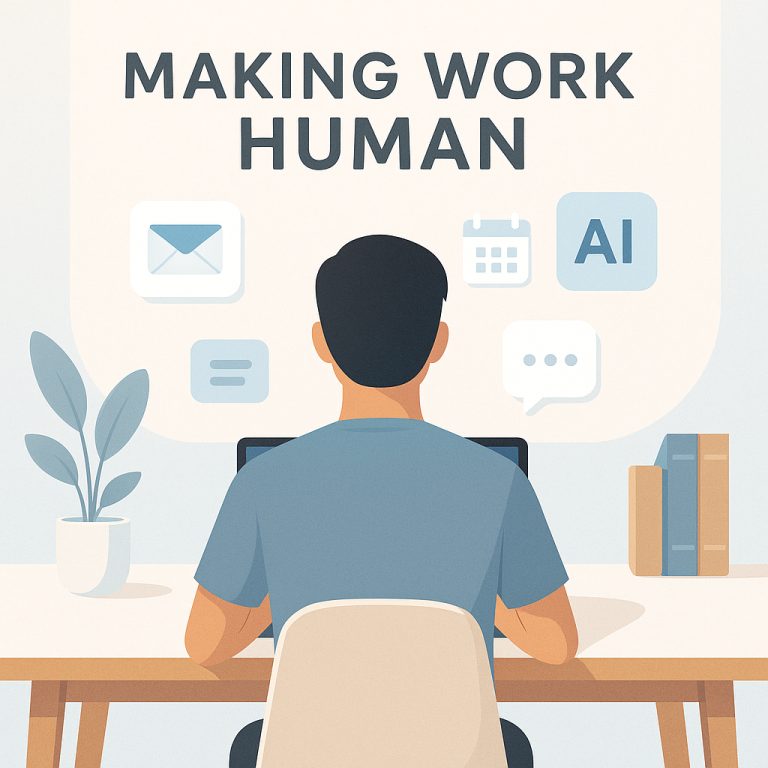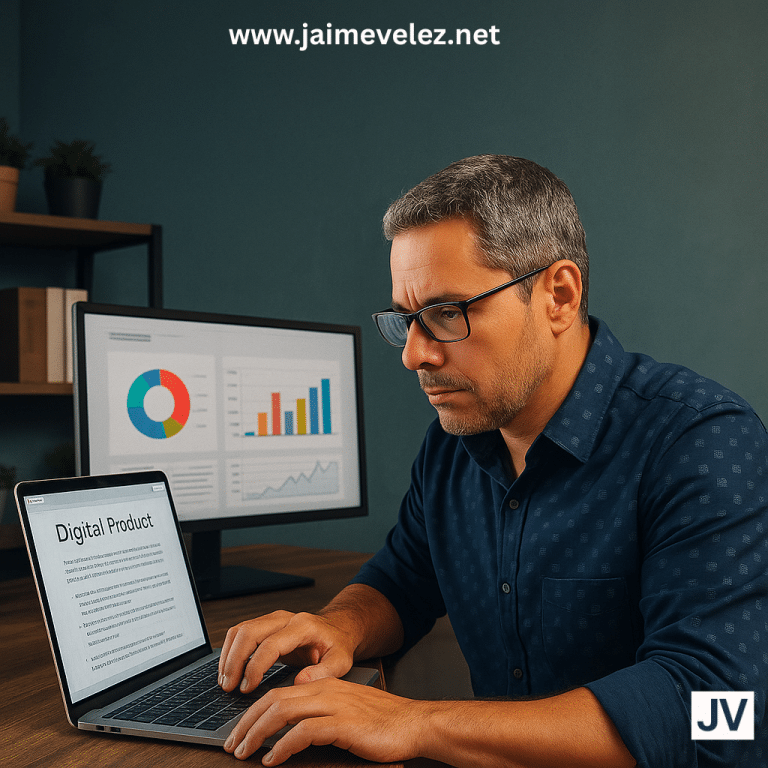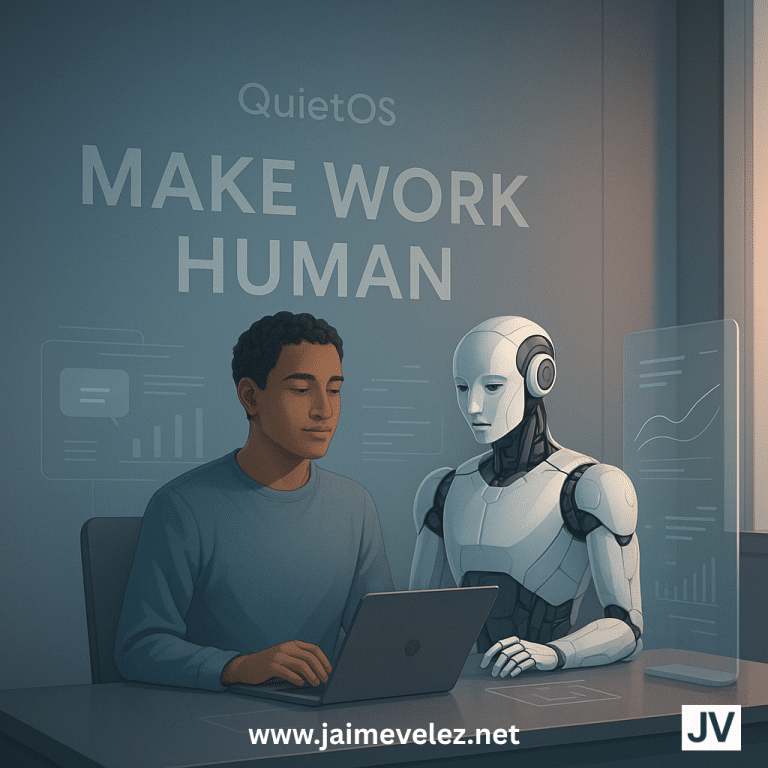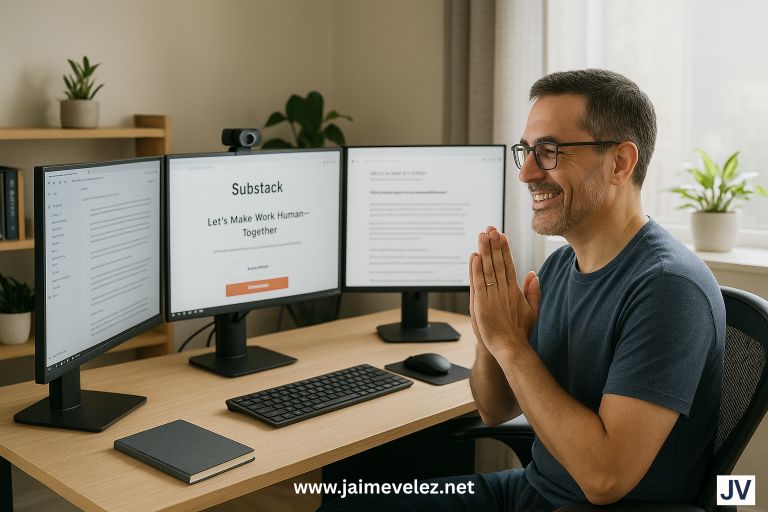What is Meaningful Work, Anyway?
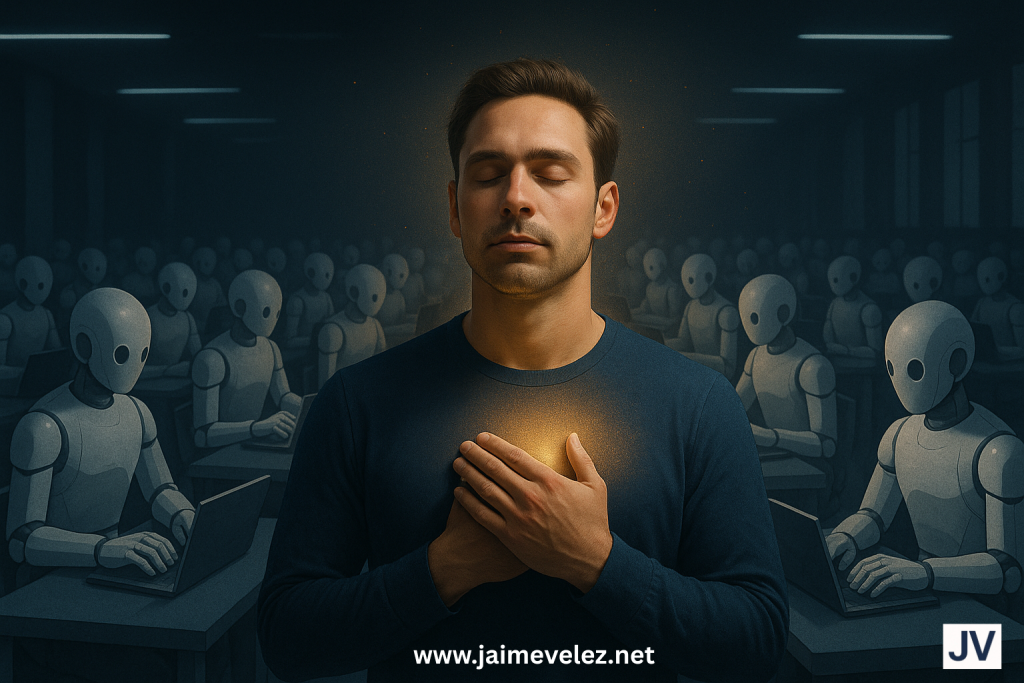
Redefining Vocation in the Age of AI
For most of my life, I thought meaningful work meant making a big splash.
Impressing the boss.
Building up the resume.
Climbing the elusive corporate ladder.
But something never felt complete.
Then I realized it wasn’t about the money, or the title, or the visibility.
It was about the meaning of work itself.
And right now, in the age of AI, we are being invited to redefine that meaning.
Not by force, but by choice. Not by fear, but by curiosity.
The tools we are building are changing how we work, how we live, and how we understand ourselves.
Behind all the innovation and disruption, one essential question remains:
What is meaningful work, anyway?
The Inner Voice That Keeps Asking “Why?”
Since the early days of my career, I’ve been fascinated by Maslow’s Hierarchy of Needs.
You’ve probably seen it.
A pyramid with basic survival needs at the bottom and self-actualization at the top.
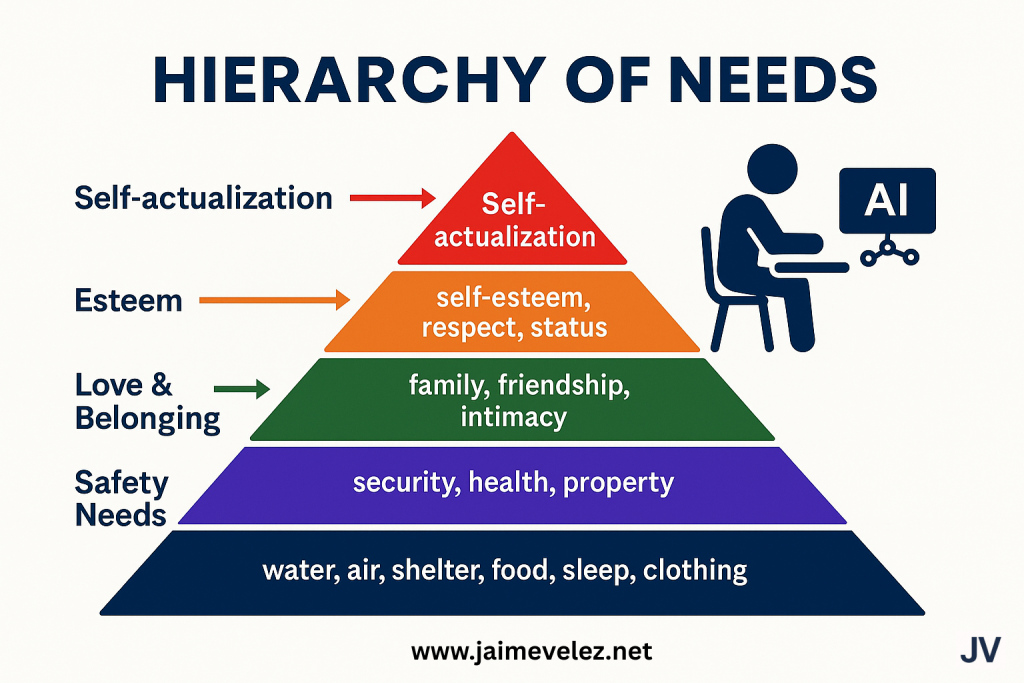
That top one always spoke to me louder than the rest.
Maslow believed the ultimate human need is not just survival or success.
It is transcendence.
It is waking up every day and doing work that feels aligned with who you really are.
Not just what you do for a living, but how you live.
The way I see it, meaningful work sits at the peak of that pyramid.
It feeds your soul, not just your wallet.
It connects your talents to something larger than yourself. And now more than ever, that kind of work is under threat.
Or perhaps it is just waiting to be reclaimed.
The Human Warning from Pope Leo XIV
Before we talk about meaningful work, let’s talk about the man raising the loudest warning against the direction we are heading.
Pope Leo XIV, our current pontiff, (our how we like to call him in Chicago: Da Pope) chose his papal name in tribute to Pope Leo XIII, the 19th-century spiritual leader who penned Rerum Novarum, a groundbreaking document defending the dignity of laborers during the Industrial Revolution.
By invoking Leo XIII, Pope Leo XIV made his mission clear.
He wants to protect humanity’s moral and spiritual essence in the face of rapid technological change.
He is not wrong to be concerned.
In his recent statements, Pope Leo XIV has cautioned against allowing AI to replace human dignity with digital convenience.
“It must be remembered that artificial intelligence serves as a tool for the benefit of humanity, not to diminish or replace it” ~Pope Leo XIV’s remarks as reported by DW.
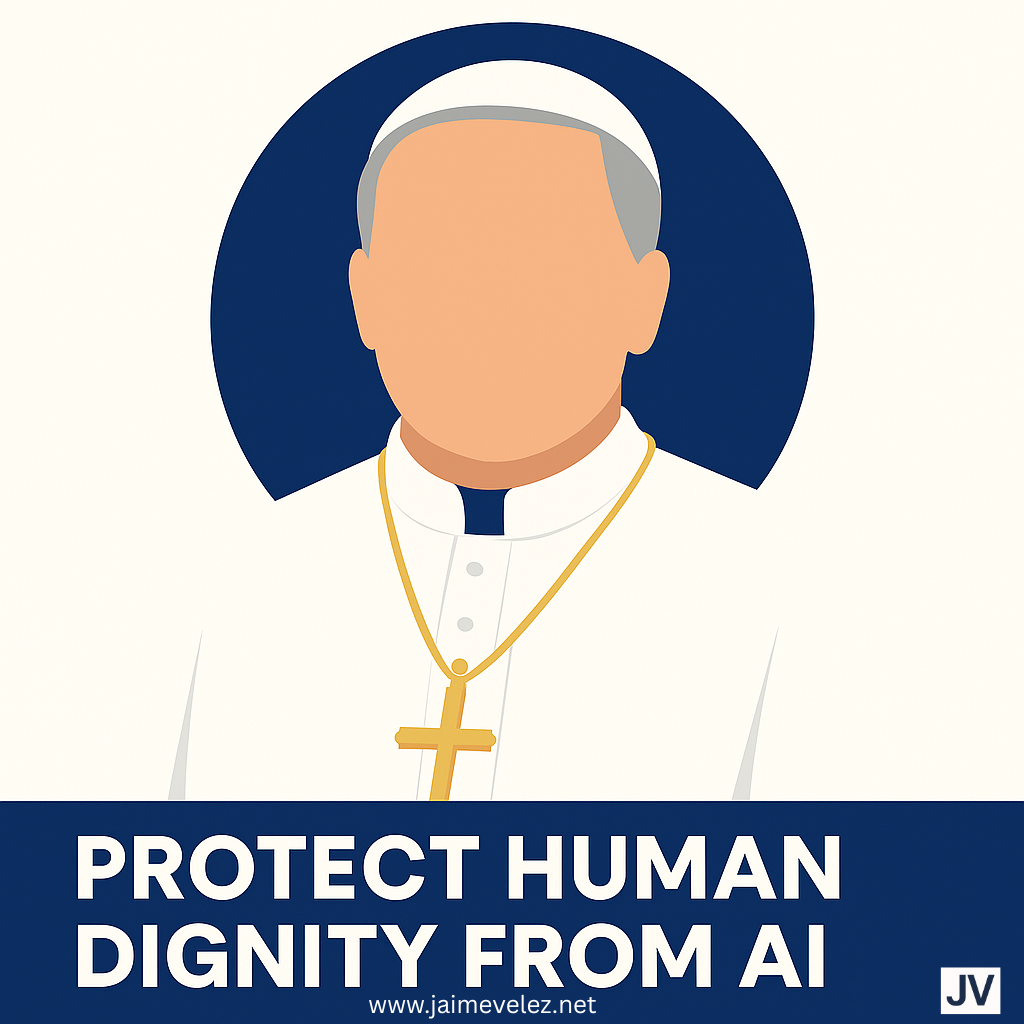
He warns that when work becomes fully automated, humans risk losing not just employment, but purpose, connection, and moral agency. And he is right to a degree.
Because AI is a mirror. It reflects whatever values we project onto it.
If we project only efficiency, we get cold systems.
If we project humanity, we get something else entirely.
This is where I stand.
AI is neither savior nor villain. It is a tool.
And it is our responsibility, mine, yours, and everyone reading this, to use that tool to keep work meaningful, humane, and soul-enriching.
That is why I write this blog.
That is why my Substack publication is called: Make Work Human.
What Work Looked Like Before Now
Let’s go back in time.
During the Industrial Revolution, “work” was about survival.
The kinds of jobs people took were grueling.
Twelve-hour shifts. Cramped factories. Dangerous equipment.
Child labor. Drudgery wasn’t a metaphor. It was reality.
But even back then in 1891, Pope Leo XIII declared in Rerum Novarum that:
“To labor is to exert oneself for the sake of procuring what is necessary for the various purposes of life, and chief of all for self-preservation. Working for gain is creditable, not shameful.”
That statement carried weight. It acknowledged work as honorable, not just practical.
It pointed to a deeper dignity. A link between human effort and moral worth.
Now fast forward to today.
Drudgery still exists, but it wears different clothes.
In the digital world we all live in, this is what it looks like:
- Inbox overload and calendar chaos
- Repetitive spreadsheet tasks
- Spending way too much time searching for information
- Sitting on Zoom or Teams meetings all day and wondering if anything actually got done
- Copying and pasting data between platforms and calling it “work”
These tasks may not be life-threatening, but they are soul-threatening.
They drain time and energy from the deeper work.
The real work.
The Quiet Rise of AI: From Drudgery to Dignity
Here’s the opportunity AI gives us:
To remove the repetition, the noise, the digital sludge.
Not so we can participate in more video calls or answer more emails.
But so we can make space for creativity, mentorship, exploration, and craftsmanship.
Meaningful work happens when there is margin.
When your brain is not on fire from constant distractions.
When your heart has room to breathe.
Let me say that again: Meaningful work requires margin.
The point of AI is not to make us do more.
It is to help us focus on what truly matters and to do it better, calmer, and with more intention.
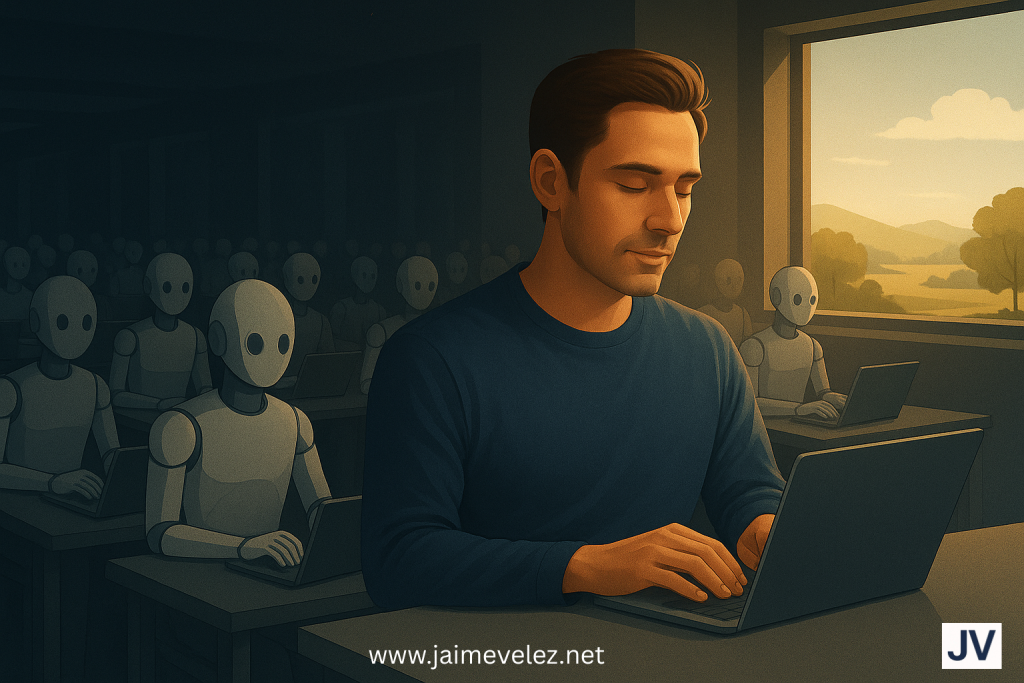
Build a Vocation, Not Just an Income Stream
We live in the age of monetization.
Everything can become a side hustle, or as I prefer to call it: a calm venture.
Every hobby can be turned into a course, a newsletter, or a digital product.
And I understand why.
I teach people how to do that too.
But let me be clear:
You are more than your monetization strategy.
Your vocation is not just what pays the bills.
It is what fills your soul.
It is the work you are called to do.
The kind that feels like a responsibility to your past self and your future self at the same time.
Sometimes vocation and income overlap.
That is the sweet spot.
That is what I help people create here.
But it starts with the right question:
“What would I still do, even if no one paid me for it?”
Answer that and you are already closer than you think.
The Mistake of Equating Busyness with Meaning
We have been tricked into believing that a packed calendar equals value.
But volume does not equal meaning.
Complexity does not equal importance. And speed does not equal worth.
Meaningful work is often slow. It is deep. It is quiet.
It is rarely flashy.
Sometimes it looks like staring out the window and thinking.
Sometimes it looks like a patient conversation with someone who needs your presence more than your answers.
Hustle does not always lead to purpose.
But purpose always leads to clarity.
So, What is Meaningful Work?
It is not a job title.
It is not a LinkedIn headline.
It is not even a dream career.
Meaningful work is a form of service.
It is what happens when you bring your full self into the task at hand, your creativity, your values, and your love.
It is when what you do helps someone else live better.
It is when your work does not just generate income, but creates ripples.
In this new world of AI, the goal is not to compete with machines.
It is to reconnect with your humanity.
That is the one advantage that can never be automated.
Five Simple Ways to Rediscover Meaningful Work
- Audit your week. Which tasks give you energy? Which ones drain you? Start subtracting the second group.
- Revisit your original “why.” Why did you get into your field in the first place? What inspired you before the noise took over?
- Talk to someone who knows you well. Sometimes others can see your strengths and purpose more clearly than you can. I’ve done this a lot, and it works well.
- Experiment with AI tools. Use them not to replace your creativity, but to clear the runway for it. Discover the real power of Personal AI.
- Write your own Meaning Manifesto. Define what values you want to carry into every project, client interaction, or product you build. Be very clear on what your life’s work will be.
A Closing Benediction
You were not made to grind. You were made to give.
You were not made to hustle. You were made to heal.
You were not made to compete with AI. You were made to collaborate with it.
To bring more humanity into a world that needs it now more than ever.
Let me leave you with this:
The promise of AI isn’t to free us from work. It is to free us for meaningful work
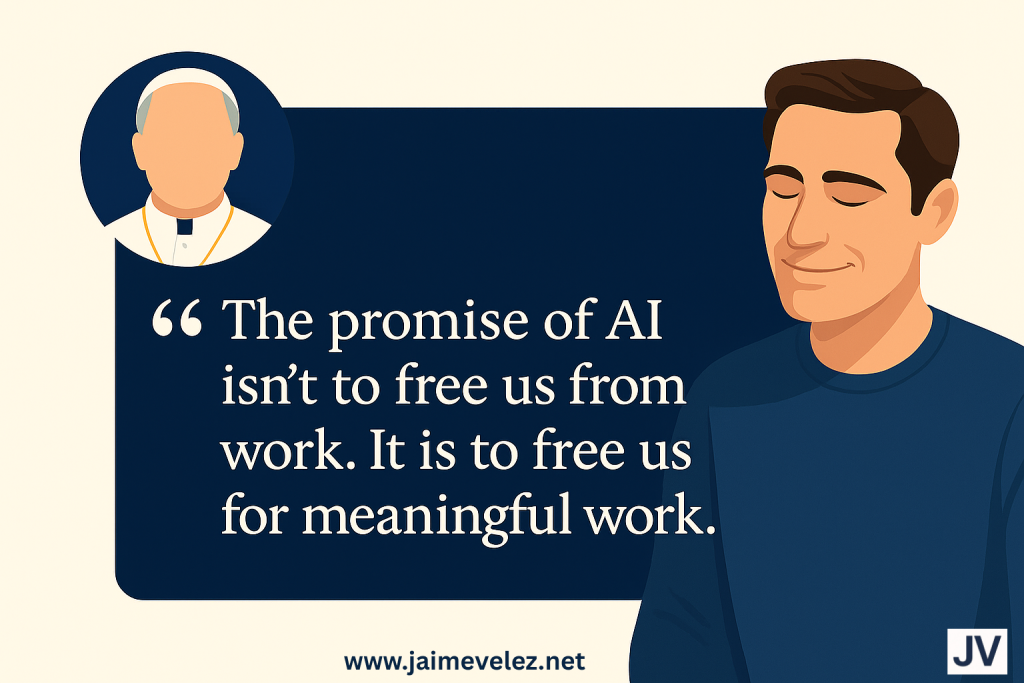
Let’s make sure we live into that promise.

